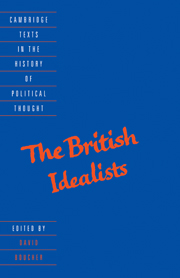Book contents
- Frontmatter
- Contents
- Acknowledgements
- Introduction
- Idealist biographies
- Select bibliography
- A note on the texts
- Evolution and society
- 1 The Social Organism (1883)
- 2 Man's Place in the Cosmos
- 3 Socialism and Natural Selection (1895)
- 4 Ethical Democracy: Evolution and Democracy (1900)
- Individualism, collectivism and the general will
- The State and international relations
- Index
- Cambridge Texts in the History of Political Thought
1 - The Social Organism (1883)
Published online by Cambridge University Press: 05 June 2012
- Frontmatter
- Contents
- Acknowledgements
- Introduction
- Idealist biographies
- Select bibliography
- A note on the texts
- Evolution and society
- 1 The Social Organism (1883)
- 2 Man's Place in the Cosmos
- 3 Socialism and Natural Selection (1895)
- 4 Ethical Democracy: Evolution and Democracy (1900)
- Individualism, collectivism and the general will
- The State and international relations
- Index
- Cambridge Texts in the History of Political Thought
Summary
English ethical philosophy is no longer purely individualistic. Hume pursued the principles of individualism to their logical conclusion, and refuted it as a theory of knowledge by revealing the absolute scepticism which it involves. The question which lies at the basis of the ‘Critique of Pure Reason’ shows that Kant considered Hume's work final, and individualism an exhausted vein of thought. History also corroborated the destructive teachings of Hume when individualism received its practical refutation in the French Revolution. Both theoretically and practically the disintegrating movement of thought completed its work and exhausted itself at the close of the last century. It isolated the individual from his physical and spiritual surroundings, and then found that he was only the shadow of a false philosophy. The present age is abandoning the philosophy which regarded mind as a thinking thing acting in vacuo, it has lost faith in moral Melchisedecs, and it demands from all the genealogy of their habits of thought and action. The problems of individualism are losing their interest, and fresh problems, which lay beyond the horizon of the past age, have by the silent progress of thought come into the fore-front of our own. The educated attention of the present is directed to the relations of individuals rather than to individuals themselves: and these relations are regarded, in a more or less uncertain sense, as essential to, if not constitutive of, individuals.
- Type
- Chapter
- Information
- The British Idealists , pp. 3 - 29Publisher: Cambridge University PressPrint publication year: 1997
- 1
- Cited by



